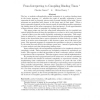Free Online Productivity Tools
i2Speak
i2Symbol
i2OCR
iTex2Img
iWeb2Print
iWeb2Shot
i2Type
iPdf2Split
iPdf2Merge
i2Bopomofo
i2Arabic
i2Style
i2Image
i2PDF
iLatex2Rtf
Sci2ools
104
click to vote
ESOP
1990
Springer
1990
Springer
From Interpreting to Compiling Binding Times
The key to realistic self-applicable partial evaluation is to analyze binding times in the source program, i.e., whether the result of partially evaluating a source expression is static or dynamic, given a static/dynamic division of the input. Source programs are specialized with respect to the static part of their input. When a source expression depends on the concrete result of specializing another expression, the binding time of this other expression is first interpreted. A safe approximation abstract values is computed by binding time analysis. This paper points out that this value-based information can be compiled into control-based directives driving the specializer as to what to do for each expression
Related Content
| Added | 11 Aug 2010 |
| Updated | 11 Aug 2010 |
| Type | Conference |
| Year | 1990 |
| Where | ESOP |
| Authors | Charles Consel, Olivier Danvy |
Comments (0)

